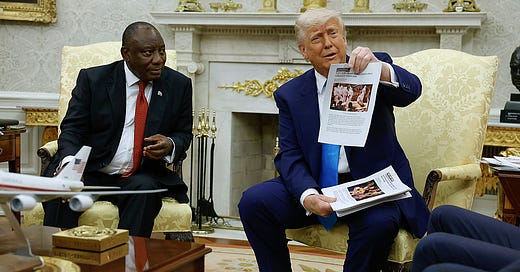
Donald Trump scolded South African President Cyril Ramaphosa at the White House last Thursday, falsely claiming that the country is allowing a "genocide" of white people. It is a fictitious narrative that has been brewing in the conservative media world for decades. But it was Elon Musk, the South African-born billionaire and Trump adviser, who helped shoehorn the theory into official presidential talking points.
To back up his claims of a "white genocide," Trump displayed misleading footage that Musk had previously shared on his social media platform, X.
Musk, however, showed no interest in the conspiracy theory until the summer of 2023, when Starlink, the satellite-based internet provider operated by Musk's rocket company SpaceX, hit a regulatory wall in its effort to enter the South African market. Only then did Musk become a proponent of the conspiracy, which he had long ignored despite its popularity among his friends and ideological allies, including podcaster Joe Rogan. Musk did not respond to a request for comment.
The conspiracy theory posits that white South African farmers — chiefly Afrikaners, the descendants of Dutch and German colonists — are being systematically slaughtered by Black marauders. But there is no evidence to support this claim. Officials in the country released a report last week showing that only one white farmer was killed over the first three months of this year, compared to five non-whites. Still, white nationalists have promoted the theory for years, particularly during the mid-2010s, before its eventual adoption by mainstream conservatives like Trump and Tucker Carlson.
A timeline of Musk's 'white genocide' advocacy
As part of South Africa's Black Economic Empowerment (BEE) rules, foreign companies that wish to operate in the country are required to provide "historically disadvantaged groups" with a 30% equity stake in local operations. The policies, which Musk has described as racist, forced Starlink to delay its planned 2023 launch in South Africa indefinitely.
In April of that year, Mondli Gungubele, South Africa's communications minister at the time, said that Starlink would be required to adhere to BEE standards before operating in the country. Gungubele also noted that SpaceX had never applied for an operating license, which remains true today.
Three months later, Musk first raised his concerns about "white genocide" in a post directed at the president of South Africa. "They are openly pushing for genocide of white people in South Africa," he wrote on X in July 2023. "@CyrilRamaphosa, why do you say nothing?"
Musk became obsessed over the next several days, warning in early August 2023 of "racial genocide" and the "killing of all white" South Africans in a half-dozen posts. That same month, the South African government began cracking down on Starlink customers in the country who had obtained the service illicitly.
The following year, outside of a couple of posts in early 2024, Musk went quiet on the issue. Meanwhile, regulators in South Africa explored granting Starlink a BEE exemption similar to its arrangements with major automanufacturers, which had established funds to support Black enterprises in lieu of handing over local equity.
Musk's concern for the white minority in South Africa returned in February 2025, just as Trump returned to the White House (with the help of nearly $300 million in funding from Musk) and moved to freeze all financial assistance to South Africa, citing discrimination against the country's white population.
Musk seized the moment by calling the South African government "tacitly genocidal" during a series of February 9 posts about "genocide against" white South Africans. He shared the posts a few days after SpaceX had pulled out of a scheduled regulatory hearing with the Independent Communications Authority of South Africa to discuss BEE rules. "SpaceX’s decision to opt out of the hearing demonstrates its lack of interest in complying with regulations and its desire for special treatment," wrote Masutane Modjadji, a South African journalist.
Rather than capitulate, South Africa chose to pause deliberations regarding Starlink until dealings between Pretoria and Washington had cooled. But a calm was never reached.
The Trump administration condemns South Africa
In March, Trump further enflamed tensions by announcing that the U.S. would begin receiving white South Africans as part of a "refugee admissions program," the main exception to the White House's refugee ban. Then, in April, Trump slapped South Africa with a 30% tariff, which he later suspended for 90 days. Trump's State Department has since used the threat of tariffs to pressure a number of other African countries to adopt Starlink.
That was the backdrop to Ramaphosa's strained visit to the White House last week. Musk was also present at the meeting, but he remained abnormally taciturn during the public portion, leaving Trump to spout provably false claims about "white farmers" being murdered by the hundreds.
Members of the South African delegation had hoped that a meeting with Musk earlier in the week would lower the temperature between Ramaphosa and Trump. The strategy failed, but Musk appears to be on the precipice of finally launching Starlink in South Africa. On Friday, the New York Times reported that South African officials had begun a policy review process that would allow Starlink to operate in the country without relinquishing a partial ownership stake.
Musk's long-held desire to launch Starlink in his homeland likely has to do with South Africa's relative wealth. It is the richest country on a continent where the cost of Starlink’s $350 hardware is prohibitive for most. South Africa's GDP in 2024 was $403 billion, more than double that of Nigeria, where Starlink has built a massive business since launching in early 2023.




These Afrikaners will also help build the MAGA base when immigrated to America with their white supremacist and racist focus
One of the first orders of business for the next Democratic president should be to nationalize SpaceX, Starlink and all.